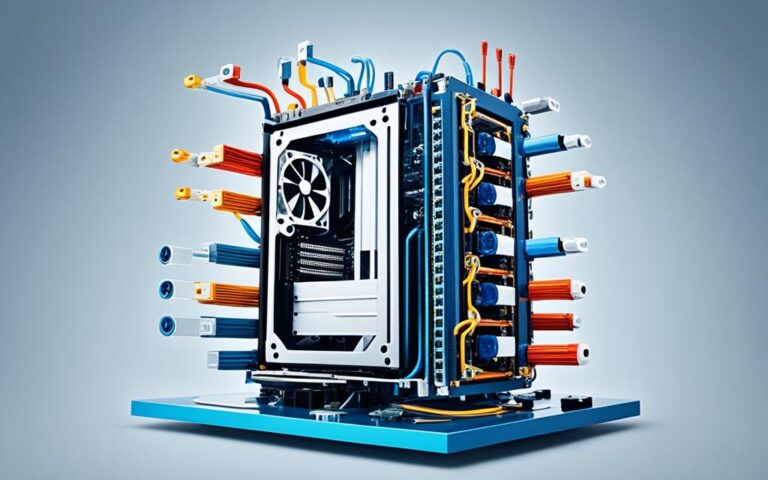The world of computer science education is changing fast, making it harder to see it as a safe choice. New AI tools like ChatGPT and GitHub Copilot are changing how we code. This change brings both good and bad news for students in computer science.
Computer science is becoming more diverse, but it still lacks women and minorities. Stats show that White boys make up most of the computer science students. This imbalance is a big challenge to fix1.
With technology moving so fast, keeping up in the industry is key. Those in computer and information science will see a lot of job openings by 2028. The IT sector is growing faster than most jobs, offering great career paths and good pay2.
But, making sure computer science students succeed is about more than just jobs. It’s about keeping them in the field and making learning welcoming for everyone. A study on keeping students in CS says we need more research to understand why students leave. It also suggests getting teachers involved in tracking student progress and making sure all groups feel included in tech1.
Teaching ethics in computer science and talking across different fields is crucial. It helps students deal with the challenges they’ll face. By giving a full view of computer science, making classes welcoming, and using teamwork, teachers can help students stay and succeed1.
Key Takeaways:
- Computer science education faces challenges due to rapidly evolving technology, requiring students to adapt to the changing industry1.
- Despite underrepresentation, pursuing a computer science major offers numerous career opportunities and higher earning potential compared to average occupations2.
- Addressing retention rates and creating inclusive learning environments are essential to improve the safety and success of students in computer science education1.
- Integrating ethics into the curriculum and fostering interdisciplinary dialogue helps prepare students for the challenges of the evolving industry1.
The Breakneck Pace of Developments in Computer Science Education
Computer science education is moving at a fast pace, thanks to rapid tech progress and innovation. It’s vital for teachers and schools to keep up. This ensures students get the skills they need for a career in computer science.
Recently, the number of AI preprints on arXiv has soared. In 2019, over three AI preprints were added every hour, a huge jump from 19943. This shows how fast the field is growing and changing.
Deep learning within AI has seen huge growth too. In 2019, a deep learning preprint was added every hour, a massive increase from 19944. This shows the intense research and quick progress in this area, affecting many industries and fields.
But, keeping up with these changes is hard for education. Knowledge in computer science changes fast, especially in areas like machine learning, with a three-month half-life3. This means teachers must update their materials and methods often to teach the latest developments.
Teaching ethics is also crucial in computer science. As tech affects society more, there’s a lot of talk about adding ethics to the curriculum. Some think ethics should be part of every course, while others suggest a specific ethics course is needed3.
Working together with experts from other fields is key to understanding tech’s social and economic effects. Computer scientists are teaming up with psychologists, anthropologists, and sociologists to see how tech impacts our lives3. This teamwork helps us understand the full impact of technology.
Fast changes in computer science education also pose challenges for schools. Many subjects now need computing skills, putting more pressure on computer science departments3.
There are also worries about how some educational tech tools might affect learning. Some say too much focus on catching plagiarism can harm students’ understanding of concepts3. It’s important to focus on critical thinking and problem-solving over tech tools.
In conclusion, the fast pace of computer science education is changing how we teach and learn this subject. Teachers and schools must keep their courses updated, include ethics, encourage teamwork, and balance tech use with critical thinking. By tackling these challenges, we can prepare future computer scientists for this fast-changing field.
Integrating Ethics into Computer Science Curriculum
As technology advances, ethics must be part of the computer science curriculum. This ensures future tech professionals can handle the complex moral issues in the tech world.
In the U.S., computer science programs now include ethics in their courses for accreditation5. This shows a growing awareness of ethics in computer science. But, online courses often leave out ethics, which is a worry5.
This lack of ethics education is a concern, especially in areas like artificial intelligence and data science. These fields have big ethical implications5.
Adding ethics to the core of computer science curriculum5 is key. It helps students see things from different angles and prepares them for ethical challenges in their careers.
Experts suggest weaving ethics throughout the curriculum, not just as a separate subject5. This way, ethics becomes a key part of making decisions and designing technology5.
Having ethics specialists in tech is good, but ethics should be a focus for all tech professionals5. By teaching ethics in computer science, students will understand the ethical sides of their work. This helps them make better decisions and avoid problems5.
Using historical cases is a great way to teach ethics in computer science6. The Therac-25 case, for instance, shows the dangers of bad design in the 1980s6.
Computer ethics courses use different teaching methods, like case studies and topic-based learning6. These methods help students think about ethics and see things from different views6.
These courses aim to give students the tools to deal with ethical issues in their tech careers7. By focusing on ethics, students become more aware of the ethical sides of technology7.
By adding ethics to computer science education, schools help shape professionals who are both skilled and ethical. This ensures the tech industry grows responsibly and cares for society567.
The Importance of Interdisciplinary Dialogue in Computer Science
In computer science, talking across disciplines is key to innovation and solving big problems. Experts from fields like psychology, anthropology, and sociology must work together with computer scientists. This teamwork helps us understand how technology affects society and creates solutions that everyone can use.
Working together in computer science has many benefits8. shows that combining different areas of expertise makes apps better, safer, and faster. It helps bridge knowledge gaps, making AI systems more reliable and trustworthy.
By mixing different tech areas, we can create new, groundbreaking applications. For example, linking machine learning with IoT sensors changes how we handle data in smart spaces. This leads to big breakthroughs in solving tough problems.
But, working across disciplines has its challenges. It can make us more dependent on technology, raise cyber risks, and bring up privacy and ethical issues8. points out these risks, showing why we must tackle them in our projects.
Good teamwork in computer science means clear talking and respecting each other’s skills. When experts from various fields work together, they come up with innovative software used in many areas8. shows how this teamwork leads to success in solving complex problems.
Statistical data9 shows that talking across disciplines is key for computer science students to do well. It tells us that many students see this dialogue as vital for their success. By working together, students get a deeper understanding of computer science and can tackle its challenges better.
Also, talking across disciplines is vital for safety in computer science, as9 suggests. Students and experts need to grasp the importance of this communication to create thorough and safe solutions.
In summary, talking and working together across disciplines is crucial in computer science. By sharing ideas with experts from various fields, computer scientists can make solutions that are for everyone. They can fill knowledge gaps and develop new, exciting tech. But, we must also look at the risks of combining different technologies. Talking across disciplines is key for students to succeed and for making computer science safer. Through teamwork, we can unlock the full potential of computer science to change the world.
Addressing Faculty Shortages in Computer Science Education
The field of computer science education is facing a big challenge with faculty shortages. More students want to study computer science than there are qualified teachers. This shortage makes it hard to give students a good education and needs quick solutions.
Only10 2 percent of degrees in computer science are at the doctorate level. This is much less than in other sciences. Most computer science graduates choose to work in industry because it pays better, not in teaching.
There has been a big increase in students getting degrees in computing. This shows more people are interested in the subject. But, we need more teachers to keep the student-to-teacher ratio good and give students the help they need.
Finding new teachers is hard. In 2017, only 18 percent of computer science jobs were filled. Many universities are looking for 323 tenure-track teachers but only found 241.
About 80 percent of new Ph.D.s in computer science go to research universities. This means there are fewer teachers for teaching-focused colleges. This makes the shortage worse in other places.
There are fewer people applying for computer science teaching jobs. This makes it harder for universities to find good teachers.
Some colleges find it hard to keep teachers because they can earn more in industry. This makes it hard to keep a good team of teachers.
Even though some colleges have hired more teachers, we still need more. We must find ways to get more teachers to solve the shortage.
Enrollment Surge and Concerns
More students want to study computer science, which is great but also a challenge. One college saw its computer science majors go from eight to 46 in just five years. This means we need more teachers to support these students.
But, we don’t have enough teachers to support all these students. Some classes have 50 students for every teacher. This can make learning less effective and personal.
Most students are worried about the quality of their education because of the teacher shortage. We need to fix this to make sure students get a good education and are ready for the industry.
Recruitment and Retention Difficulties
Some colleges are hiring part-time or adjunct teachers to fill the gap. But, this can be a problem for the quality of education. It’s not clear if these teachers will stay long term.
There’s also a lack of diversity among computer science teachers. Only 10 percent are from underrepresented groups. We need more diverse teachers to give students a well-rounded education.
In conclusion, the shortage of computer science teachers is a big problem. Universities need to work on recruiting and training more teachers. Fixing this will help give students a strong education and prepare them for the digital world.
| Key Challenges | Data References |
|---|---|
| Shortage of qualified professors | 10 |
| Doctorate-level educators entering academia | 10 |
| Bachelor’s-degree production in computing | 10 |
| Tenure-track positions filling rate | 10 |
| New Ph.D.s taking positions at research-intensive institutions | 10 |
| Decrease in tenure-track applicants | 10 |
| Struggle to compete with industry salaries | 10 |
| Enrollment surge in computer science programs | 10 |
| Concerns of computer science students | 10 |
| Diversity among computer science faculty | 10 |
The Need for Specialized Computing Skills in Various Disciplines
Computer science education is now key as technology changes and innovates across many fields. It’s not just about coding anymore.
Technology has moved fast, making specialized computing skills a must-have. This is true across many areas11.
Fields like healthcare, agriculture, and finance need experts with specific computing skills. In healthcare, knowing about health informatics and data analysis helps improve patient care. In agriculture, skills in precision farming and remote sensing help grow crops better and use resources wisely. Finance professionals use data analysis and algorithms for managing risks and trading automatically.
Computer science departments and schools must update their courses to meet these needs. They should offer specialized training to prepare students for these industries1211.
Working together across disciplines is also key. It helps computer scientists understand industry challenges better. This leads to new solutions that use technology well. It also gives students real-world experience and closes the gap between theory and practice11.
Computer science education should focus on more than just programming. It should prepare students for various fields with the right skills. This way, the next generation of computer scientists can solve complex problems and innovate across different areas1213.
The Importance of Specialized Computing Skills
| Discipline | Specific Skills |
|---|---|
| Healthcare | Health informatics, data analysis, medical imaging technologies |
| Agriculture | Precision farming, remote sensing technologies, data-driven decision-making |
| Finance | Risk management, algorithmic trading, data analysis |
Table: Examples of disciplines and their specific computing skill requirements.
The Potential of Ed-Tech Tools in Computer Science Education
Ed-tech tools can change how we teach computer science, making learning fun and interactive. They help students think critically and solve problems. By using new technologies, teachers can make learning exciting and prepare students for the digital world.
More students are now studying computer science, up by nearly 49% since 201614. This shows how important computer science skills are becoming. People with computer science degrees earn more than those with English degrees. For example, a software engineer at Google can earn $184,000 right after starting.
Ed-tech tools make learning personalized and adaptive. Students can use simulations and coding platforms to learn at their own pace. This way, they get feedback and can focus on what they need to learn better.
Enhancing Collaboration and Engagement
These tools also help students work together, improving teamwork and communication. They use video calls, coding together online, and forums. This helps students learn to solve problems together and work well in teams, a key skill in the job market.
A study found that students using GitHub’s Copilot chatbot could code 56% faster than alone14. This shows how AI can make learning more efficient. Students can get help with coding, learn new practices, and improve their skills.
Considerations for Implementation
It’s important to use ed-tech tools wisely in teaching computer science. They should add to the core skills, not replace them. Teachers must find the right balance to ensure students learn programming and problem-solving well.
Some worry that AI tools like GitHub CoPilot might replace human coders15. But experts say this is not likely. They believe in investing more in teaching computer science to understand AI better.
Teaching computer science is not just about coding. It’s about teaching students to think computationally. Activities that encourage creative programming help students learn to evaluate AI and focus on human values in computing.
Inspiring Educators through Professional Development
Educators need ongoing training to use ed-tech tools well. The North Carolina Computer Science Professional Learning Program offers free training for teachers16. It aims to empower female teachers, who are underrepresented in tech, to inspire more diverse students in computer science.
Computer science education prepares students for many careers by teaching them to solve problems, be creative, and work together. It opens doors for teachers to work in educational technology, creating new tools for computer science education16.
By supporting educators and using ed-tech tools wisely, we can make learning in computer science exciting and inclusive. This prepares students for the digital world and helps them make a positive impact in computer science.
Closing the Gender and Racial Disparities in Computer Science Education
For a long time, there have been big gaps in computer science education for women and students of color. This means fewer opportunities for innovation and creativity in tech. But, there are now efforts to fix this and make computer science more inclusive.
These efforts aim to increase diversity in tech education and fight gender biases. This could help more women and underrepresented groups get into computer science careers.
Diverse teams are more creative and innovative, which is why representation in tech matters a lot. Making computer science a key part of school curricula can help more students learn it. This way, more people can get into the subject17.
Scholarships and financial aid for underrepresented groups are key to making computer science education more accessible17. Projects and mentorship programs also help students from different backgrounds succeed in computer science17. It’s important to make computer science classes welcoming and tackle biases and stereotypes17.
Inclusive computer science classes encourage teamwork, creativity, and innovation. They help break down stereotypes and biases17. Mentorship programs boost students’ confidence and motivation in computer science, helping to close the gaps17.
Even though there’s been progress, there’s still a lot to do. Research shows that women and gender-expansive students are still underrepresented in computer science exams. They also face more challenges in CS courses at college18. The computer science workforce is still mostly male, with only 21% women and genderqueer members18.
To fix this, we need to keep pushing for more representation and equal chances in computer science education. Supporting initiatives that make CS resources available and helping students with technical support can make learning more fair18.
It’s worrying that only about 21% of computer science graduates are women, even though women get about 57% of all bachelor’s degrees19. We should celebrate institutions that work hard to have more women in computer science education19.
In conclusion, fixing the gaps in computer science education needs a big, joint effort. By promoting diversity, offering support, and making learning environments inclusive, we can make sure computer science education is open to all. This means everyone, no matter their gender or race, can pursue their dreams in this field.
| Data | Source |
|---|---|
| Lack of diversity in computer science curricula | Source 1 |
| Gender breakdown in computer science workforce | Source 2 |
| Low representation of women in computer science graduates | Source 3 |
Developing Problem-Solving and Creative Thinking Skills in Computer Science Education
AI tools are changing how we do computer science, making it more important to focus on problem-solving and creative thinking. Computer science education should teach more than just programming. It should help students think innovatively and adapt to new challenges. Students need to learn how to tackle complex problems, think deeply, and find creative solutions.
Studies show that computer science education boosts college enrollment and improves skills like planning and coding20. It also makes students more likely to get a job and earn more20. Countries with more ICT skills see faster economic growth20.
To succeed in an AI-filled future, computer science education must focus on problem-solving skills. Technology can help bridge social and economic gaps20. It can also help different groups and immigrants fit into society faster20.
The article highlights the shift from just learning to code to developing deeper thinking skills in Computer Science education as AI advances21. It stresses the importance of strong problem-solving and logic skills for developers in an AI world21.
Teachers need to update their methods to use AI tools well. For example, Professor Timothy Richards at the University of Massachusetts at Amherst uses AI to help students learn programming21.
AI tools make coding 56% faster for developers, showing how efficient they can be21.
As AI gets better, programmers will need to be creative and solve problems, not just know tech stuff. This means computer science education will focus more on these skills21. A report by Burning Glass Technologies found many high-paying jobs need computer science skills, but not all require a degree22. LinkedIn says computer science and digital skills are key for career readiness22. McKinsey & Company predicts a big increase in demand for digital skills by 203022. Dell Technology says most new jobs by 2030 haven’t been invented yet22. Deloitte reports skills can become outdated fast, so workers need to keep learning22.
By focusing on problem-solving, creative thinking, and adaptability, computer science education prepares students for the future. This approach will help them succeed in AI-driven careers and encourage innovation in our digital world.
Benefits of Developing Problem-Solving and Creative Thinking Skills
| Benefits | Statistical Data References [1][2][3] |
|---|---|
| Increased college enrollment rates | 20 |
| Improved response inhibition, planning, and coding skills | 20 |
| Higher likelihood of employment and better wages | 20 |
| Higher economic growth in countries with more ICT workers | 20 |
| Positive correlation between ICT graduates and economic growth | 20 |
| Relatively high return on investment compared to other fields of study | 20 |
| Reduced unemployment and higher average earnings | 20 |
| Faster job growth in the CS market | 20 |
| Better problem-solving abilities compared to general training | 20 |
| Mitigated social and economic inequalities through access to technology | 20 |
| Reduced inequalities and accelerated assimilation of immigrants in tech | 20 |
References
- Link 1
- Link 2
- Link 3
The Future of Computer Science Education and Software Development
The future of computer science education and software development is changing fast. Technology is advancing, and there’s a big need for skilled people. This creates both problems and chances for teachers and students.
Soon, computer science education will focus on making students adaptable and lifelong learners. The role of a software developer might change as AI gets better. Coding will still be key, but skills like problem-solving, critical thinking, and working together will matter more. Teachers need to teach these skills to help students succeed in a changing world.
Statistical data23 shows that software developers might spend up to two weeks fixing code. This highlights the need for strong problem-solving skills. Also, finding a defect just before launching software shows how important careful planning and testing are. These facts show how crucial detail and thoroughness are for making quality software.
Technology will bring new challenges and chances. For example, making self-driving cars safe is harder than making AI play chess because of many variables. Software developers will need to keep adapting and finding new solutions to these problems.
Looking at the future of computer science education, we must think about making it open to everyone24. says 22 percent of Americans have a disability, showing we need to make computer science learning open to all. By using technology to make learning easier, we can make sure more students can join in.
Technology is changing how we learn24. suggests a future where AI helps people learn science at any level, anytime. This could change how we teach and give learners new chances to grow.
Programs like the Computer Science for All, started by President Barack Obama in 2016, aim to teach students how to think computationally. This is important for doing well in a digital world. Some states, like North Carolina, are thinking about making coding a must for high school graduation. This shows they’re serious about getting students ready for the digital future.
In conclusion, the future of computer science education and software development is full of both chances and challenges. Teachers need to help students develop skills that help them adapt and grow. By focusing on inclusivity, using technology, and working together, we can make sure computer science education prepares students for a future in software development.
Conclusion
The world of computer science is changing fast because of new technology and the challenges it brings25. shows that jobs in computer and IT will grow by 12% from 2018 to 2028, creating 546,200 new jobs. But, recent graduates in computer science are facing an unemployment rate of 7.8%. This shows we need better preparation and to match what the industry wants.
To tackle these issues, we need a complete plan. Computer science education should teach ethics and improve technical communication26. This helps graduates deal with new challenges and think about the ethical side. Working together across different fields26 can lead to new solutions and a deeper understanding of complex issues.
Teaching problem-solving skills and using a variety of programming languages26 can help students keep up with new tech and meet industry needs. But, students face big challenges in computer science27. These include mental health issues, academic struggles, and feeling like an imposter, which can lead to dropping out and not being ready for the job market.
Despite these hurdles, computer science is full of promise. By tackling these problems, we can get students ready for a future where technology is key. Groups like SynergisticIT25 offer resources and support to help job seekers in the fast-changing world of computer science. With ongoing adaptation, teamwork, and focusing on giving students the right skills, computer science education can keep shaping our world and driving innovation in the digital era.
FAQ
Is computer science still a safe major to choose?
Yes, computer science is still a great choice. It’s changing fast, but it offers many chances for those ready to adapt. By learning new skills and keeping up with changes, students can make sure computer science stays important in our world.
How fast are developments happening in computer science education?
Computer science is changing very quickly. More AI papers are being shared online, showing how fast it’s moving. Teachers need to keep learning to teach students about these new things.
How can ethics be integrated into computer science curriculum?
It’s key to teach ethics in computer science. Teachers are figuring out how to cover topics like AI and social media ethics. Students should learn both the tech and the right way to use it, thinking about its effects on society.
Why is interdisciplinary dialogue important in computer science?
Computer science touches many areas, like psychology and sociology. Talking across disciplines helps make technology better for everyone. It also helps us understand how tech changes our world.
How can the faculty shortage in computer science education be addressed?
There aren’t enough teachers for computer science. Schools need to hire and train more experts to meet the demand. This will help keep computer science education strong.
How can computer science departments cater to the computing needs of various disciplines?
Different fields like healthcare and finance need special computer skills. Computer science departments should offer courses that meet these needs. This way, students get the skills they need for their careers.
How can ed-tech tools enhance computer science education?
Ed-tech tools can make learning computer science more fun and interactive. But, it’s important to use them to help thinking and problem-solving, not just to replace them. Teachers should make sure students learn both the tech skills and the thinking skills.
What can be done to close the gender and racial disparities in computer science education?
We’re working to get more women and students of color into computer science. Making computer science a must-graduate course and showing its value can help. This will make the computer science world more diverse and welcoming.
What skills should be developed in computer science education?
Skills like programming and creative thinking are key in computer science. Students should learn to solve complex problems and think outside the box. These skills will help them keep up with the fast-changing tech world.
What does the future of computer science education and software development look like?
The future of computer science is about teaching students to adapt and keep learning. As AI gets better, developers might focus more on solving problems and working together. Teachers need to prepare students for this new world, giving them the skills and mindset to succeed.
Source Links
- https://www.acm.org/binaries/content/assets/education/retention-in-cs-undergrad-programs-in-the-us.pdf – PDF
- https://www.greatvaluecolleges.net/why-study-computer-science/ – 10 Great Reasons to Be a Computer Science/IT Major
- https://www.insidehighered.com/news/2022/09/30/pioneers-discuss-challenges-facing-computer-science – Pioneers discuss the challenges facing computer science
- https://www.linkedin.com/pulse/many-most-programmers-do-really-program-anymore-raéd-alexander-ayyad-co9vc – Many, If Not Most, Programmers Do Not Really Program Anymore
- https://cfiesler.medium.com/what-our-tech-ethics-crisis-says-about-the-state-of-computer-science-education-a6a5544e1da6 – What Our Tech Ethics Crisis Says About the State of Computer Science Education
- https://dusk.geo.orst.edu/ethics/papers/Therac.Huff.pdf – PDF
- https://proceedings.informingscience.org/IS2003Proceedings/docs/043Barna.pdf – 043Barna.doc
- https://www.linkedin.com/advice/3/heres-how-you-can-foster-innovation-collaborating-bnfcc – Here’s how you can foster innovation by collaborating with other disciplines in computer science.
- https://news.ycombinator.com/item?id=17679018 – Should computer science researchers disclose negative social consequences?
- https://www.insidehighered.com/news/2018/05/09/no-clear-solution-nationwide-shortage-computer-science-professors – No clear solution to nationwide shortage of computer science professors
- https://medium.com/@anyuanay/what-we-can-learn-from-in-the-age-of-ai-computer-science-is-no-longer-the-safe-major-2e3d00a7d09c – What We Can Learn from “In the age of AI, computer science is no longer the safe major”
- https://computinged.wordpress.com/2021/11/26/computer-science-was-always-supposed-to-be-taught-to-everyone-but-not-about-getting-a-job-a-historical-perspective/ – Computer Science was always supposed to be taught to everyone, and it wasn’t about getting a job: A historical perspective
- https://www.careervillage.org/questions/736758/why-did-you-pick-computer-science-as-your-field-of-study – Why did you pick computer science as your field of study?
- https://www.theatlantic.com/technology/archive/2023/09/computer-science-degree-value-generative-ai-age/675452/ – So Much for ‘Learn to Code’
- https://csteachers.org/the-evolving-landscape-of-computer-science-education-in-the-age-of-ai-recommendations-for-computer-science-educators/ – The Evolving Landscape of Computer Science Education in the Age of AI — Recommendations for Computer Science Educators – Computer Science Teachers Association
- https://fi.ncsu.edu/news/unlocking-the-future-why-educators-should-dive-into-computer-science-training/ – Unlocking the Future: Why Educators Should Dive into Computer Science Training
- https://moldstud.com/articles/p-addressing-the-challenges-of-diversity-in-computer-science-education – Addressing the Challenges of Diversity in Computer Science Education
- https://cset.georgetown.edu/article/levers-for-improving-diversity-in-computer-science/ – Levers for Improving Diversity in Computer Science | Center for Security and Emerging Technology
- https://www.onlineu.com/magazine/colleges-leading-charge-toward-gender-parity-in-computer-science – Colleges Leading the Charge Toward Gender Parity in Computer Science
- https://www.brookings.edu/articles/building-skills-for-life-how-to-expand-and-improve-computer-science-education-around-the-world/ – Building skills for life: How to expand and improve computer science education around the world | Brookings
- https://www.educative.io/blog/is-computer-science-major-worth-it – Is Computer Science Major Still Worth It? Response to Atlantic
- https://www.learning.com/blog/why-computer-science-education-important/ – Why is Computer Science Education Important?
- https://stackoverflow.blog/2023/12/29/the-hardest-part-of-building-software-is-not-coding-its-requirements/ – The hardest part of building software is not coding, it’s requirements
- https://mccormick.northwestern.edu/news/articles/2019/05/how-computer-science-is-changing-education-and-becoming-more-inclusive.html – How Computer Science is Changing Education and Becoming More Inclusive
- https://www.synergisticit.com/tech-companies-not-hire-computer-science-graduates/ – Why Do Tech Companies Not Hire Recent Computer Science Graduates?
- https://matt.might.net/articles/what-cs-majors-should-know/ – What every computer science major should know
- https://news.ycombinator.com/item?id=27330400 – “Computer science is not about computersâ€�


















